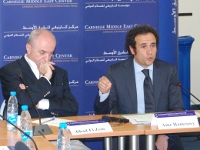Registration
You will receive an email confirming your registration.
IMGXYZ2555IMGZYXWhile Egypt was once considered to be a model for the Arab world, political, economic, and social stagnation has led to a distinct shift in regional perceptions of the country, concluded Carnegie’s Amr Hamzawy at a roundtable discussion with Annahar newspaper’s Jihad El-Zein. Hamzawy and El-Zein discussed the challenges facing modern Egypt and the influence of external actors in the region.
A Distinctive Model
The political model in Egypt differs from that of other authoritarian regimes in the Arab world, contended El-Zein. Egypt, he asserted, had what he described as an ‘incomplete’ democratic system, which allowed for freedom of expression but which failed to bring democracy to the political sphere.
Perspectives on Egypt
- Local Perspective: The Egyptian public perceives that a crisis is overtaking their country as a result of its failure to achieve a real democracy, Hamzawy stated. He compared the current crisis to the situation in Egypt in 1952, right before the military coup that replaced the Egyptian monarchy. Yet in spite of its political paralysis, for the past five years Egypt has registered historically unprecedented rates of social and economic growth. Egyptian unemployment rates have frozen and free media and public demonstrations have become more common.
- Regional Perspective: Regionally, Egypt has lost its historic prestige among its neighbors. Other nations now view it as the “sick man of the Arab world." While its cultural and political supremacy had been waning for years, Egypt’s policies following Israel's 2009 war on Gaza hurt its regional image. The nation took another political hit when neighboring states disregarded Egypt’s interests while negotiating a deal for the re-distribution of the Nile River’s water.
Egyptian Paradoxes
Hamzawy highlighted several paradoxes afflicting Egypt:
- Lack of Democracy vs. Increased Freedom: In 2002, the ruling regime promised to lift the Emergency Laws and establish a system for the rotation of power, constitutional changes, and respect of human rights. None of those promises have been kept. However, there has been an increase in media freedoms in Egypt and the regime no longer routinely engages in active suppression of public demonstrations. It has even indicated a willingness to hear and act on demonstrators’ demands.
- Authoritarianism vs. Political Plurality: Despite constitutional changes which increased the power of the regime, legislative changes favoring political plurality have also occurred, such as a law that gives the prime minister more authority, and others that organize political parties. However, many of these changes increasing political plurality have yet to be implemented.
Egypt as a Model
For a long time, Egypt was seen as a model for the Arab world. This view was held by Egyptians themselves and by people across the Middle East and North Africa. Now, even the idea that Egypt is somehow unique among the Arab nations is being questioned.
- An Inward Focus: Egyptians view their country as having a strong geopolitical role, Hamzawy stated. However, the Egyptian media, both private and state-owned, has narrowed its focus to internal issues in recent years. He suggested that this concentration on domestic matters is intended to compensate for the state's growing regional weakness. Egypt is no longer viewed as a strong model by its neighbors, a fact which would be all the more obvious if the media reported on regional, rather than internal, stories. This has had some positive repercussions, as the internal focus has been a means for the public to hold officials responsible for their behavior, in the absence of judicial and legislative channels.
- Semi-Authoritarian Model: While Egypt’s political weaknesses are growing more apparent, there is still reason to see Egypt as a unique case among Arab states, Hamzawy contended. Unlike other authoritarian and semi-authoritarian states, Egypt is distinguished by a lack of daily political bloodshed (unlike Saddam Hussein's Iraq), a strong central state (unlike in Yemen), and the existence of real political plurality.
Democracy in the Region
Jad Yateem, from Annahar newspaper, argued that the expansion of democracy in the region is a result of Western, rather than internal, pressures.
- Western Impetus: Elections in the region are driven by U.S. democracy promotion efforts, stated Yateem. From Egypt’s 2005 elections, which led to the allocation of 88 parliament seats to the Muslim Brotherhood, to elections in Iraq, Kuwait, and even the United Arab Emirates, he contended that the pressure for democratization is fundamentally Western.
- A Local Driver of Change: Hamzawy disagreed, arguing that external pressure may have been one of the factors promoting change in Egypt, but it was not the main driver. The election of 88 members of the Muslim Brotherhood to the Egyptian parliament, Hamzawy explained, was not in the interest of the United States. He added that change in Egypt has generally been brought about by the ruling regime; even the opposition has contributed little.
